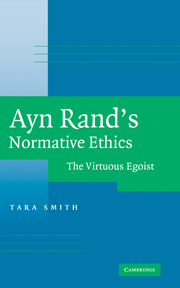Book contents
- Frontmatter
- Contents
- Acknowledgments
- 1 Introduction
- 2 Rational Egoism: A Profile of Its Foundations and Basic Character
- 3 The Master Virtue: Rationality
- 4 Honesty
- 5 Independence
- 6 Justice
- 7 Integrity
- 8 Productiveness
- 9 Pride
- 10 Implications for Certain Conventional Virtues: Charity, Generosity, Kindness, Temperance
- Conclusion
- Appendix: Egoistic Friendship
- Select List of Works Consulted
- Index
3 - The Master Virtue: Rationality
Published online by Cambridge University Press: 05 June 2012
- Frontmatter
- Contents
- Acknowledgments
- 1 Introduction
- 2 Rational Egoism: A Profile of Its Foundations and Basic Character
- 3 The Master Virtue: Rationality
- 4 Honesty
- 5 Independence
- 6 Justice
- 7 Integrity
- 8 Productiveness
- 9 Pride
- 10 Implications for Certain Conventional Virtues: Charity, Generosity, Kindness, Temperance
- Conclusion
- Appendix: Egoistic Friendship
- Select List of Works Consulted
- Index
Summary
On Rand's view, the purpose of morality is to guide individuals to the achievement of their happiness. The selfish end of personal well-being is the reason why any person should adhere to morality's prescriptions. We turn now to the substance of those prescriptions by examining the specific virtues that she believes to be required by rational egoism. In this chapter, I begin by explaining Rand's conception of what a virtue is and then elaborate on the primary virtue, rationality. This is the central, overarching virtue from which the other major virtues are derivative. We will consider what rationality is, why it is a virtue, and what it demands of us, in practice.
THE NATURE OF VIRTUE
We saw in the previous chapter that a value is that which one acts to gain and/or keep and that an objective value is an end whose achievement would enhance an agent's life. A virtue, Rand maintains, is “the act by which one gains and/or keeps” an objective value. The moral virtues thus designate the fundamental kinds of actions that will advance a person's life. In Galt's speech in her novel Atlas Shrugged, Rand describes virtues as pertaining to the relationship between consciousness and existence and she begins each paragraph introducing a virtue with the statement that that virtue is the “recognition” of a particular fact.
- Type
- Chapter
- Information
- Ayn Rand's Normative EthicsThe Virtuous Egoist, pp. 48 - 74Publisher: Cambridge University PressPrint publication year: 2006



